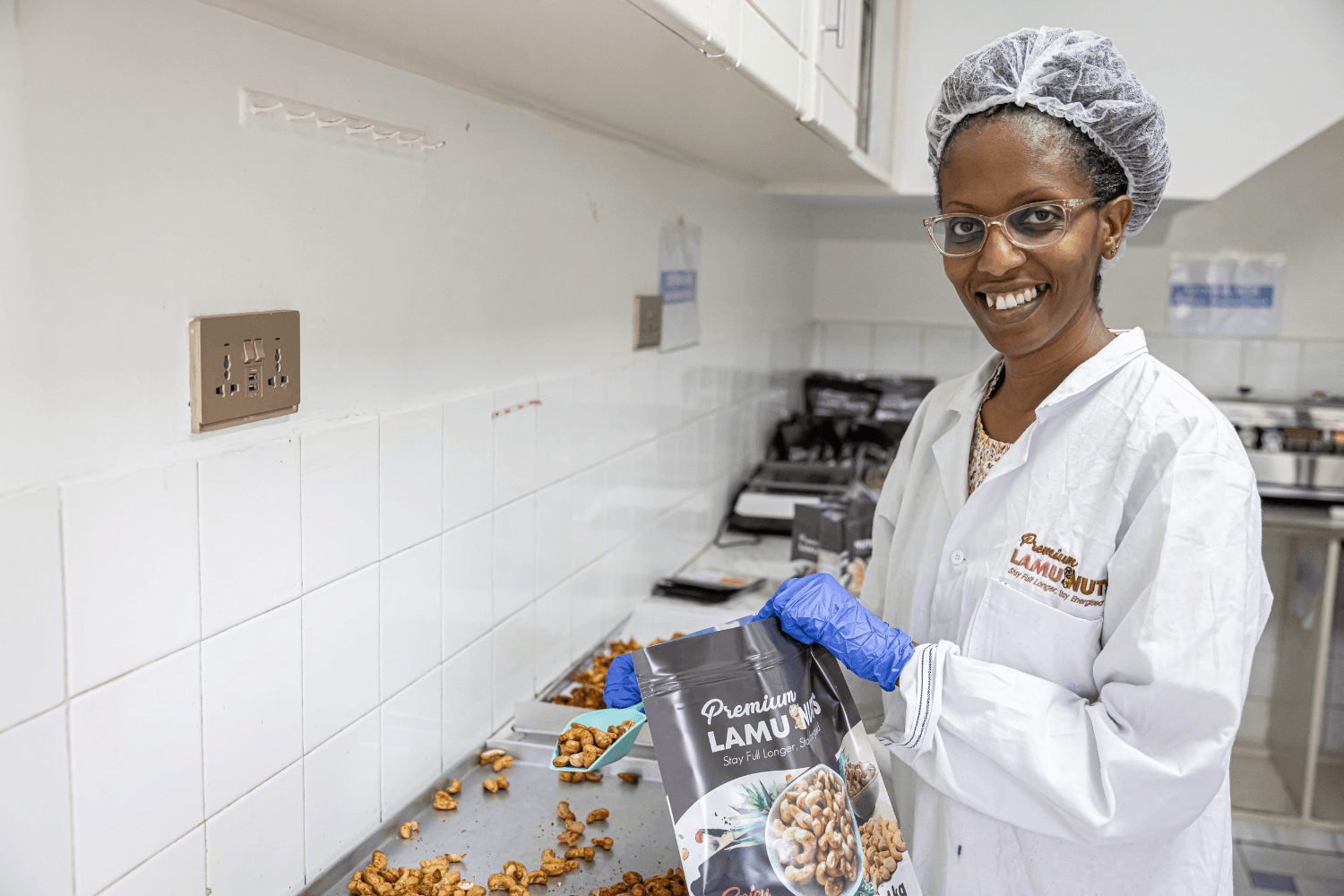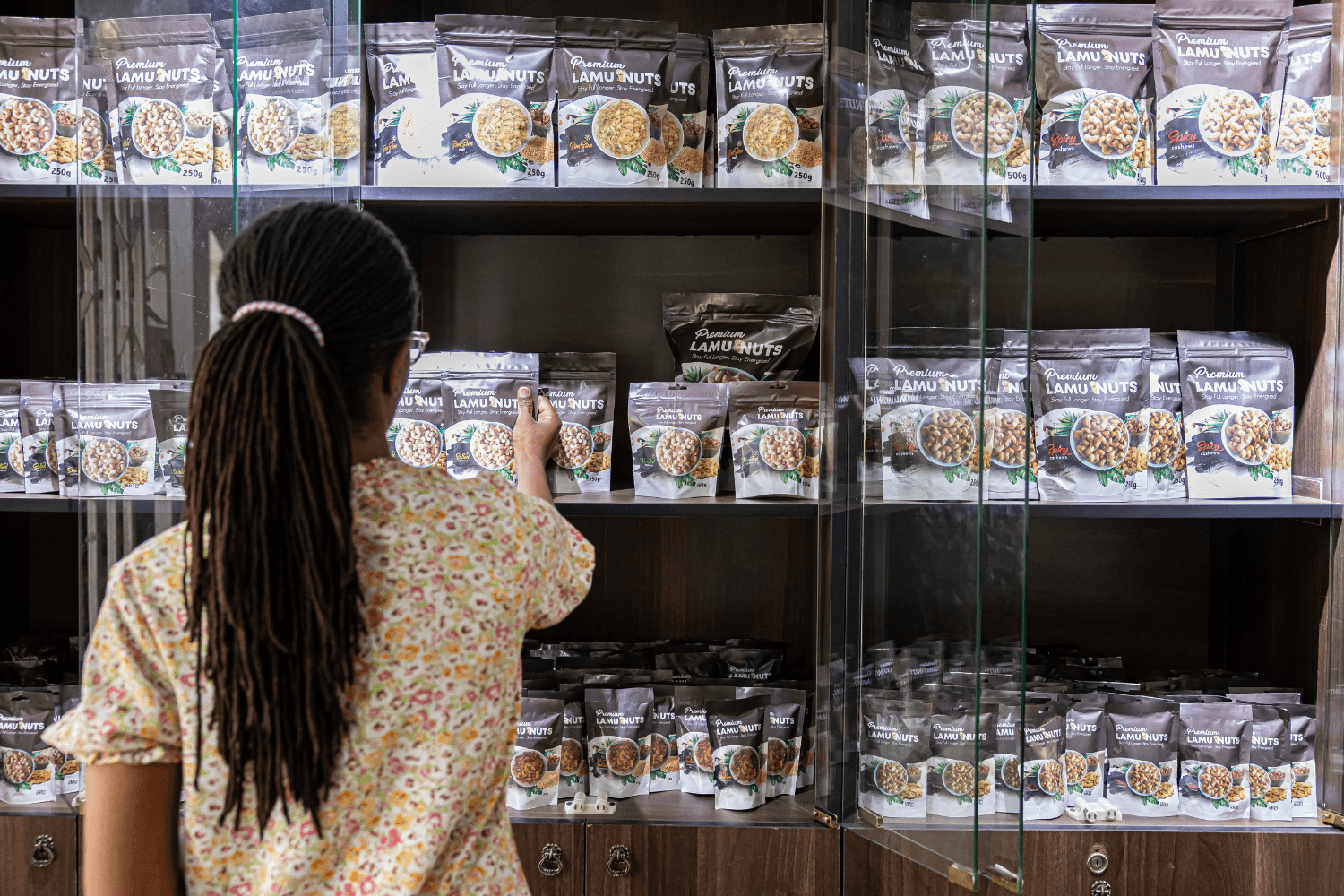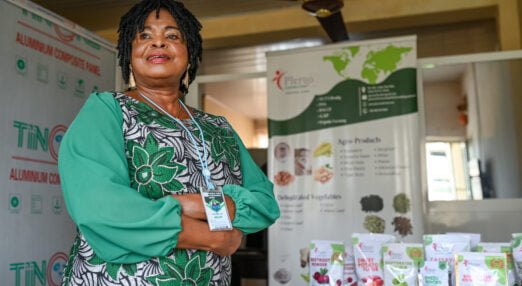Naomi’s story: locally grown & soon to be globally known nut products
Naomi Kimuyu's premium nut brand empowers local nut farmers in Nairobi, Kenya. Our Road to Growth programme supported her to access new markets and increase her business' impact.

Naomi Kimuyu never planned on running a business, but her delicious homemade nuts became so popular with friends and colleagues, that they began insisting she sell them. At first she was reluctant, as she already had her hands full with family and other responsibilities, but she couldn’t ignore the growing demand for her products. She decided to go for it, working with local suppliers in Nairobi, Kenya to launch Africa Lamu Nuts Ltd., a premium nut brand. Here, she shares how our Road to Growth programme supported her business to enter new markets and how her success has impacted her community.
“I started the business as a side project while I was working another job. I used to roast peanuts and carry them to my office to eat as a snack during the day. My colleagues would always ask to have some of them, so I would share.
At some point they started asking for me to sell them some. I was reluctant at first, but I said I would sell just to them, since they liked the nuts so much. But more and more people started asking for them and it became apparent that that there was a need for a product like this.
I started to get serious about the business; thinking about the packaging, the brand name, and all the other aspects you need to consider when starting a company. Bit by bit, I became an entrepreneur. What started as meeting a need for my colleagues and for myself has expanded to meet the needs of many other people.

We buy our nuts directly from local farmers. Oftentimes, these farmers are not given a fair price for their products, so it is hugely important for us to bring their nuts to the right markets and give them the best possible price.
We buy our nuts directly from local farmers, who work very hard to prepare, plant, and grow the high-quality nuts we need. Oftentimes, these farmers are not given a fair price for their products, so it is hugely important for us to bring their nuts to the right markets and give them the best possible price. In doing so, we are supporting their economic empowerment.
As a woman entrepreneur, I have faced some challenges. Women already have so many activities and responsibilities to take care of outside of work, which takes up a lot of our time. I’m married with children, so there’s homework to help with and family responsibilities to manage every day. Then I also have to manage the business, the staff, and all the other things that need to be taken care of at work. It’s a challenge to juggle all of these responsibilities, but it’s doable. Supporting our families is often part of the reason why women get into entrepreneurship in the first place, so we are motivated to work hard and be successful.
Another challenge is access to funding and information on how to run a business effectively. Before I started my business, I was working a full-time job and never imagined I would need that kind of information, so I was really starting from scratch. As the needs arose, I had to figure out how to address them. I had a lot to learn and very little free time to devote to learning. I needed to know how to grow my business beyond what it was. That’s where the Road to Growth programme came in.

I joined the programme and was very pleased with the course content. It encouraged me to consider business positioning, financials, marketing, and many other aspects that I hadn’t previously focused on.
I heard about Road to Growth through a friend of mine, who had participated in a different programme with the Cherie Blair Foundation for Women. She explained how important the programme was for her entrepreneurial journey and how it had positively impacted her business. It sounded like a great opportunity for me.
I joined the programme and was very pleased with the course content. It encouraged me to consider business positioning, financials, marketing, and many other aspects that I hadn’t previously focused on. I learned how to deepen my understanding of who my customers were, so that I could respond to their unique needs. Initially, I was just responding to the needs of anyone who showed up, but the programme taught me to be more strategic. This allowed me to run the business more effectively.
I also gained clarity on the business’s position in the ready-to-eat snack market. There are many ready-to-eat snacks available already, but this gave me the chance to define exactly what we are doing in terms of our own business and what makes us unique. I grew to understand that we are a premium product; all our nuts are of the highest quality in terms of colour, taste, and other industry standards. This knowledge helped us make decisions about what markets to enter with our products.

Having this opportunity to export and access new markets allows those existing customers to continue to enjoy the nuts wherever they are, while allowing us to reach new customers in their area.
We’ve started working with DHL to explore how we can enter new markets outside of Kenya. They’ve provided us with training on what it means to access international markets, which has made me feel more confident about exploring these opportunities. We already have clients interested in bringing our products to their countries to distribute to their customers. We’ve also used DHL’s services to send product samples to prospective clients in other countries.
One thing we found is that many of our customers are Kenyans who are living abroad. They buy our nuts whenever they are home in Kenya and take them back to wherever they are living. But when the product runs out and they need to restock, what do they do? Do they have to wait until they return to Kenya? Having this opportunity to export and access new markets allows those existing customers to continue to enjoy the nuts wherever they are, while allowing us to reach new customers in their area.

It’s a great honour to provide economic empowerment in my community.
When more people are able to access our products, it increases our revenue streams and allows us to reach more customers. This benefits the local farmers in our supply chain and creates a ripple effect of impact for their families and community.
My business has given me the opportunity to make difference people’s lives. We’ve created jobs and supported local suppliers. It’s a great honour to provide economic empowerment in my community.”

Become a corporate partner
Learn how your company can work with us to bring our services to more women entrepreneurs in low and middle income countries.

Read more news...
-

Unlocking markets for women entrepreneurs: building pathways to inclusive economic growth
Gender biases and structural barriers limit women’s access to new markets. This inequality hinders not only their business growth but also economic empowerment on a wider scale. Senior Programme Manager, Cristina Rivero, explores.
Read more
-

Announcing Road to Markets, our new programme building women’s access to markets
Road to Markets will empower women entrepreneurs to increase their market access and grow their businesses through vital training and coaching.
Read more
-

Building confidence: A key to women’s business success
Confidence is crucial for women entrepreneurs' business journeys. Our Senior Manager - Evidence and Learning, Rachel Seftel, explains.
Read more

